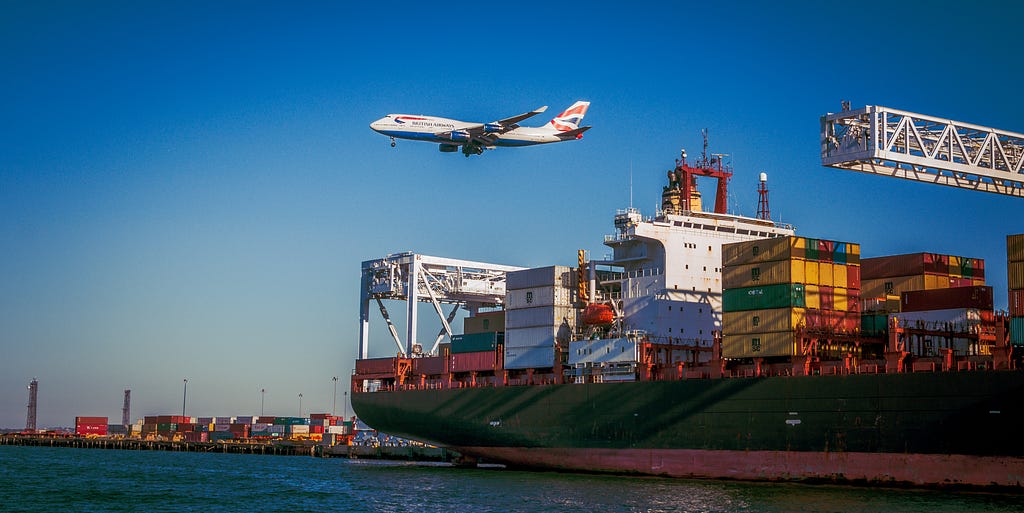Latest news about Bitcoin and all cryptocurrencies. Your daily crypto news habit.
5 Ways Tech Is Transforming eCommerce Logistics
Despite logistics appearing as a term back in the 1940s, it has been pursuing the same objectives through decades:
● enhancing supply chain performance, including service quality
● providing transparent information exchange
● identifying optimal routes and solutions in the manufacturing process
There are different types of logistics depending on the business niche. These are transportation, manufacturing, informational, distributional, storing, commercial, and marketing logistics, to name a few. Considering the fact that the global economy is based on unified principles, resources, and processes, all types of logistics share similarities.
In eCommerce, which is one of the most profound business niches out there, logistics play a key role in the optimization of customer service and the decrease in costs.
The thing is, as opposed to offline business, online sales points usually service large numbers of people from various locations around the world. Thus, optimized supply chains in digital retail is a crucial factor in ensuring successful business operation.
Research shows that global logistics spending is set to hit $10.6 trillion by 2020, and the expenses are getting higher by the year. Let’s discuss where technology appears in this equation, and how it transforms the entire logistics industry.
 Photo by Ray Kacaribu on Unsplash
Photo by Ray Kacaribu on Unsplash
5 Ways Technology Is Transforming eCommerce
Technologies are coming to change the way logistics providers operate. Ecommerce consultants from Iflexion suggest the following list of five areas where digital innovations are impacting eCommerce logistics most.
Artificial intelligence and automation. Backed by automation, artificial intelligence is already being successfully adopted in various modern solutions for logistics, such as warehouse robotics, computer vision-based barcode scanning, drone delivery, etc.
The key value of artificial intelligence for logistics today is that it allows rationally planning supply chains (for instance, with the help of AI algorithms, it’s possible to select most optimal routes for transporting a product from point A to point B). At the same time, automation solutions promise to replace a significant chunk of many routine responsibilities found in large-scale call-centers and other customer support departments.
Internet of Things. The notion of the ‘Internet of Things’ first came up in the late 90s, but it has found the practical application in logistics not that long ago. For example, GPS-based geolocation data generated by RFID tags can facilitate product shipment tracking. Using historical data analysis also allows enhancing logistics operations.
Generally speaking, IoT is finding many applications in logistics: active/passive electronic RFID tags; use of global low-voltage networks instead of the traditional Internet; satellite trackers helping to monitor product locations in real time. All that makes real-time data analytics possible, which is crucial for every single medium- or large-scale online store.
A successful case of implementing IoT in the logistics-related workflow is the one from Rogue Ales. The company producing hop for its authentic ‘fresh hop’ and ‘wet hop’ beer implemented a special location tracking technology for its time-sensitive products. As their hop is not dried but is sent for immediate use in breweries, it is crucial for the company to deliver raw materials in no longer than 12 hours, otherwise, the beer would lose its quality. Apart from tracking the current location, the company’s employees also use special indicators to collect data on the temperature and dampness during transportation.
Real-time analytics using Big Data. Analytics in real time is not an ‘IoT-exclusive affair’ when it comes to logistics. Much of it is made possible with Big Data.
Operating large volumes of data is always a rather complex and cumbersome task if done manually. The tiniest lack of attention spawns risks of provoking errors that will negatively affect your business processes further on. Moreover, as the volumes of data grow, their processing requires a more dedicated workforce, which also brings in human factor-related risks into play.
That’s why special solutions for automatic processing of Big Data were developed in order to mitigate these risks. In logistics, such tools can aid significantly by identifying the patterns and trends while also helping to predict the overall efficiency of a logistics company’s performance. Such Big Data solutions are actively adopted for supply chain optimization, fuel tracking, predictive maintenance of vehicles, and so on.
Route planning. For an eCommerce business processing thousands of orders from customers around the world, transportation is a big issue that potentially affects customer satisfaction if the delivery is late. Delivery destinations are random in general, and transport operators seldom have access to resources to optimize their route planning and shorten delivery cycles.
However, this complex issue can be resolved with the help of dynamic route planning systems, more and more of which are appearing by the day. They help to decrease planning time to a few minutes and allow controlling the process of cargo loading and delivery online. Last but not least, they also help to significantly optimize transportation expenses.
Digital twins of supply chain processes. Reliability is the cornerstone of logistics businesses, helping them to keep operations efficient. However, if the main system crashes and data gets lost, business downtime is inevitable unless you take care of the safety appropriately.
The simplest way to do that is to regularly make data backups in the cloud, pairing physical assets and processes with their digital simulations. In particular, creating digital copies of the data used in your logistics processes, you decrease the chances of one of your network’s nodes failing at some point and making your workflow stop for an indefinite period of time.
The Bottom Line
Summarizing the overview above, the listed technologies can help eCommerce projects become more profitable for owners and affordable for consumers at the same time.
The combination of artificial intelligence, IoT, Big Data, real-time analytics, and digital twin technology is what eCommerce businesses should look out for to optimize their logistics processes. Implementation of these innovations promises to create more efficiencies, reduce delivery time and costs, as well as contribute to customers’ satisfaction with digital retailers.
5 Ways Tech is Transforming eCommerce Logistics was originally published in Hacker Noon on Medium, where people are continuing the conversation by highlighting and responding to this story.
Disclaimer
The views and opinions expressed in this article are solely those of the authors and do not reflect the views of Bitcoin Insider. Every investment and trading move involves risk - this is especially true for cryptocurrencies given their volatility. We strongly advise our readers to conduct their own research when making a decision.

